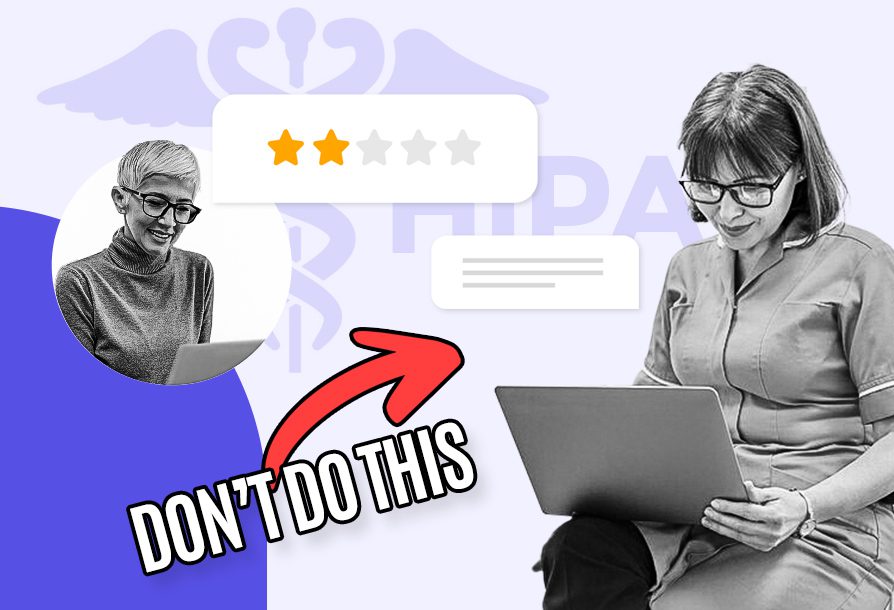How Medical Practices Should Respond to Bad Online Reviews with HIPAA in Mind

Online reviews can make or break a medical practice in this digital age. Positive reviews attract new patients and enhance the reputation of the practice, while negative reviews can lead to a decrease in patient visits and harm the practice’s reputation. Responding to negative reviews in the healthcare industry presents a unique challenge due to the Health Insurance Portability and Accountability Act (HIPAA). Here is a comprehensive guide on how medical practices should respond to bad online reviews while remaining compliant with HIPAA.
1. Respect HIPAA Regulations
HIPAA is a federal law designed to ensure that Protected Health Information (PHI), or sensitive health information, is not shared or disclosed without the patient’s express consent. According to HIPAA, anything that reveals a patient’s identity, location, or medical condition is considered PHI. Practices must ensure that their responses to online reviews do not disclose any PHI.
Example: If a patient posts a review mentioning their treatment for a specific condition, responding with any information about their treatment, visit, or even acknowledging their status as a patient could constitute a HIPAA violation. For instance, if a patient says, “I received excellent care for my diabetes,” a compliant response would avoid any mention of their condition or confirming their visit.
Reference: The American Medical Association provides detailed guidelines on HIPAA compliance in digital communications, highlighting the importance of protecting patient privacy in online interactions.
2. Do Not Acknowledge the Reviewer Is a Patient
When responding to a review, never acknowledge that the reviewer is or is not a patient. Simply acknowledging that someone is a patient at your practice is a violation of HIPAA.
Example Response: “Thank you for your feedback. We strive to provide excellent care and would like to address your concerns. Please contact our office directly at [phone number] so we can discuss this matter privately.”
Reference: HIPAA Journal discusses several cases where healthcare providers inadvertently violated HIPAA by acknowledging patients in online reviews.
3. Keep Responses General
It is vital to provide responses that do not specifically address any information about the patient or their visit. Responses should be kept general and professional.
Example Response: “Success is built on service, so we take feedback seriously and continuously work to improve our services. Contact us so we can understand and correct your issue.”
Reference: Medical Economics emphasizes the importance of general responses that do not reveal any patient-specific information, providing case studies of compliant and non-compliant responses.
4. Take the Conversation Offline
Encourage the reviewer to contact the office directly. This allows for a private discussion where the practice can address the patient’s concerns without risking a HIPAA violation.
Example Response: “Your experience is very important to us. Please reach out to our office at [phone number] and we will do our best to address your concerns. We look forward to talking with you and resolving this issue.”
Reference: PatientPop outlines strategies for taking conversations offline and provides templates for compliant responses.
5. Use Practice by Numbers for Efficient Review Management
Practice by Numbers provides an all-in-one platform to easily and efficiently manage multiple reviews from their software, allowing practices to track and manage reviews across all platforms and ensure timely and compliant responses.
Example: Practice by Numbers enables staff to be alerted when new reviews are posted, allowing them to respond promptly and professionally. It also tracks, reviews, and responds to the information without the need to visit multiple review sites, all from within the software’s dashboard.
Reference: Practice by Numbers provides comprehensive review management where engaged interactions are HIPAA-compliant and straightforward.
6. Monitor and Manage Reviews Regularly
Regularly monitor online reviews to quickly identify and address negative feedback. Timely responses can demonstrate your commitment to patient satisfaction and potentially mitigate the impact of negative reviews.
Example: A review management system will keep track of all reviews from various platforms and alert the staff as soon as new reviews are posted. This ensures no review goes unnoticed and allows for immediate action.
Reference: Forbes explains tools and practices in online reputation management, highlighting the importance of frequent monitoring.
7. Create a Standardized Response Process
Create a protocol for responding to online reviews. Train staff on HIPAA regulations and ensure they understand how to respond appropriately to both positive and negative feedback.
Example: Develop a library of response templates that employees can use to develop HIPAA-compliant responses for common scenarios. Regular training sessions can ensure that all staff members are up-to-date on best practices.
Reference: Becker’s Hospital Review discusses the importance of standardizing responses and educating employees on proper responses under HIPAA.
8. Consider Professional and Legal Advice
Consult with legal counsel or a HIPAA compliance expert to develop a response strategy that will maintain patient confidentiality while addressing the concerns raised in reviews. Professional guidance can help navigate complex situations and avoid potential violations.
Example: Having a legal team review your response protocols and specific responses to ensure compliance can save the practice from potential lawsuits and fines.
Reference: The National Law Review presents examples of legal pitfalls and best practices for responding to online reviews in the healthcare sector.
9. Focus on Customer Service and Quality Improvement
Take all feedback as an opportunity to improve your services. Address the root causes of complaints and implement changes to enhance patient satisfaction. Demonstrating a commitment to continuous improvement can positively influence your online reputation.
Example: If multiple reviews mention long wait times, consider revising scheduling practices or increasing staff during peak hours. Regularly reviewing feedback can help identify trends and areas for improvement.
Reference: Harvard Business Review discusses using customer feedback for continuous improvement and presents case examples of effective strategies.
10. Respond to Positive Reviews
While it’s crucial to handle negative reviews carefully, don’t forget to respond to positive ones. Acknowledging and thanking patients for their positive feedback can help build a positive online presence.
Example Response: “Thank you for your kind words. We are delighted to hear about your positive experience and look forward to serving you in the future.”
Reference: Psychology Today discusses the psychological benefits of acknowledging positive feedback and how it can foster a loyal patient base.
11. Be Professional and Respectful
Respond to all reviews—positive, negative, and neutral—in a professional and respectful manner. Avoid engaging in arguments or expressing frustration. A calm and composed response benefits the practice.
Example: Even if a review is harsh and unjustified, responding professionally and offering to continue the conversation offline helps defuse the situation.
Reference: Inc. provides tips on maintaining professionalism in online interactions, emphasizing the importance of a calm and polite tone.
Conclusion
Responding to bad online reviews while complying with HIPAA requires a careful and strategic approach. By understanding HIPAA regulations, keeping responses general, taking conversations offline, and focusing on quality improvement, medical practices can address patient concerns effectively without compromising patient privacy. Utilizing tools like Practice by Numbers for efficient review management, developing a standard response protocol, and seeking professional guidance can further ensure that responses are appropriate and compliant. Ultimately, maintaining professionalism and a commitment to patient satisfaction can help mitigate the impact of negative reviews and enhance your practice’s reputation.
References:




